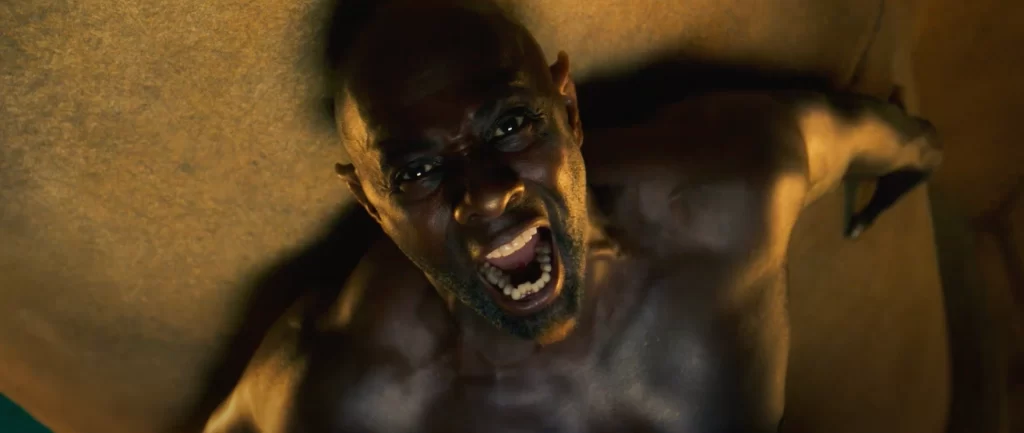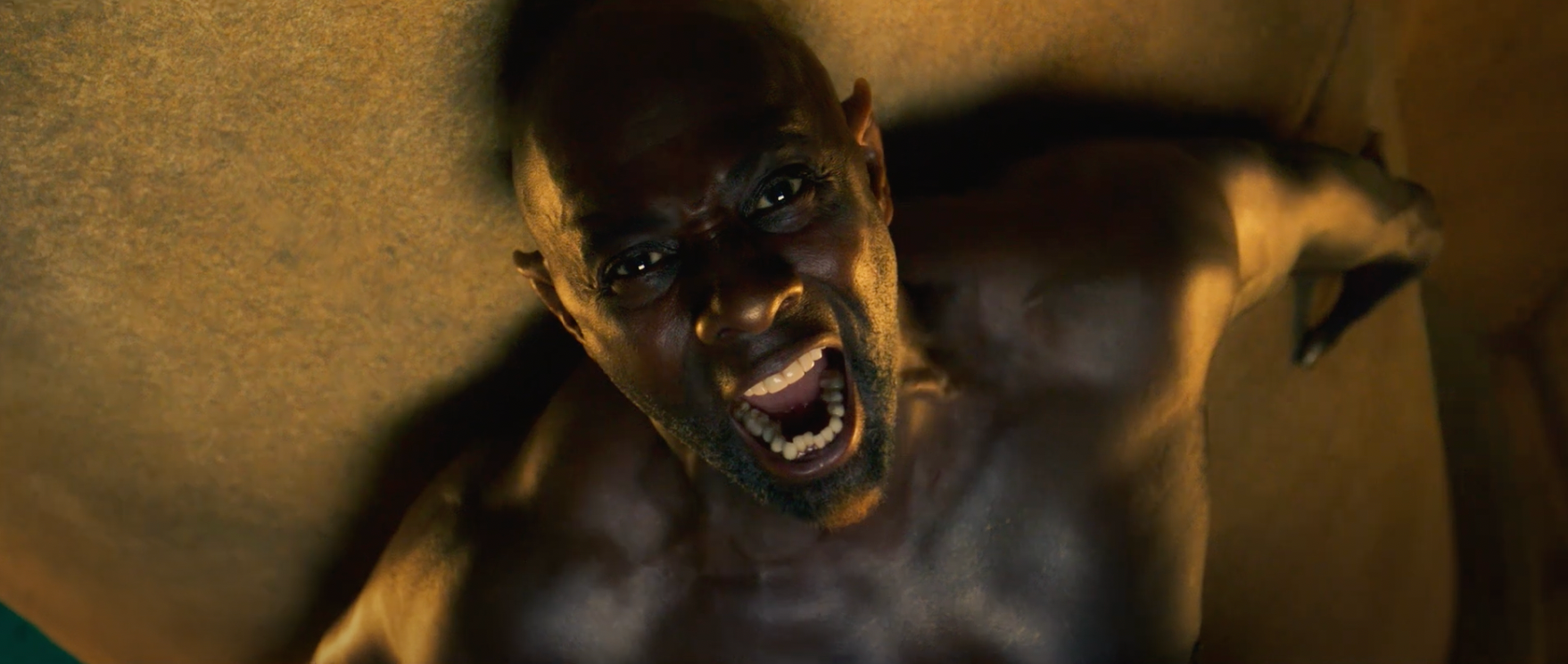Three Thousand Years of Longing is a Moral Train Wreck – has no one noticed this? Trigger warning. There is going to be a metric butt-ton of politics in this discussion of the movie Three Thousand Years of Longing. Not intentionally. I’M NOT THE ONE BRINGING THE POLITICS INTO THIS. No. Hold on. There are no politics here. There shouldn’t be. But there will be a lot of discussion of latent racial issues. And the fact that George Miller… like, WHAT WAS HE THINKING?
Now, I’m a HUGE Miller fan. Mad Max is otherworldly great. And this man will do what he’s going to do. There is no talking Miller off the ledge. None. But, this time…
Now… if you haven’t seen the movie yet – you are going to want to hold off on reading the rest of this post, solely because it will spoil the movie for you. Personally, I’m fine ruining it for you if you’d rather talk through the issues than see the movie. But you need to decide before moving to the next paragraph. Okay? Great.
Three Thousand Years of Longing is a Moral Train Wreck – Let’s See Why
Meet Alithea. A very lonely, seemingly sad, British scholar that regularly witnesses otherworldly hallucinations. But we all have hallucinations, don’t we? No. No, we don’t. Not like Alithea. She sees demons. Now, while in Istanbul, Alithea acquires a bottle – you know… the one with the Djinn in it? (Funny story – since I started gaming 30 years ago – I have always gamed with the name Djinn, or Djinnster, or Mahamotti-Djinn (a character from the Magic the Gathering card game)… sorry… trivia.) Anyway, she obviously unleashes the Djinn from the bottle and – of course – it offers to grant her three wishes. BUT! The trick!? They need to be her heart’s desire. Alithea is convinced it’s a trap, so the Djinn tells her three tales from his past, and ultimately, how he came to be trapped in the bottle.
Story #1 – The Queen of Sheba. She happened to be his cousin, and also his one true love. Well, King Solomon woos the Queen, and ultimately traps the Djinn. Right? So he can keep the Queen of Sheba for himself. Makes perfect sense. Don’t ask too many questions.
Story #2 – Gulten. Well, Gulten is a concubine that lives in the castle of Suleiman the Magnificent. She finds the bottle… and she wishes that Suleiman’s son, Mustafa, would fall in love with her. Then, after that? She wishes to bear him a child. Only glitch? Mustafa is murdered by his freakazoid father. And as a result, what does Gulten do? She hides the bottle, and doesn’t make her last wish. For one hundred years, the Djinn wanders the palace. Can’t be seen, can’t be touched. Why? Because, um… the bottle had been hidden? I know, I didn’t write the story. Eventually though, the bottle is found by a different concubine…of the sultan of Ibrahim. Djinn appears and pours it one WAY too heavy – scaring her to death. She ultimately wishes for the Djinn to return to his bottle, and to be cast into the sea.
Story #3 – Zefir. Enter the final story. The wife of a Turkish merchant who is given the bottle as a gift. It had been found in the 1850’s. Well, Zefir, what does she wish for? Knowledge. Which the Djinn grants in piles of books… and she’s allowed to see the world as other djinns see it. Now, the Djinn becomes to care for Zefir. But Zefir doesn’t like him always around… and so she wishes to forget that she had ever met the Djinn. Oooh Snap. And voila, she’s imprisoned him all over again.
Now. Alithea… how do these stories impact her? Well, they affect her so much that she wishes that they would fall in love. Hrm. And after? They both move to London. Problem? The Djinn is becoming weaker and weaker as a result of satellite transmissions – that and cell towers. Omnipotence? Bah. But he becomes so sickly that he can’t speak. So she uses her second wish to help the Djinn to speak again. And she tells him that she felt badly that she kept them from being able to fall in love naturally. Because, of course. And her third wish? With her third wish she sets the Djinn free, and allows him to return to the realm of the djinn. But instead of never seeing him again, she visits every three years or so. The end.

A Deeper Dive Into Three Thousand Years of Longing
Trust me here – I didn’t go looking, or digging, to see this perspective on this film… it is all bubbling right here at the surface. I mean, if you even give the movie a single shred of your cognitive abilities… sure, movies are for fun. Got it. That will be comment number one below. That’s fine. But this movie is the retelling of colonization all over again. It starts with the “foreign lands” of Turkey. Right there, we have flattened these lands to two dimensional vantages of real places, with real people. It is the colonial view of the world. Right? Sure! It’s beautiful! Sure, it’s lovely. But, even so, it’s other-worldly. It’s ultimately other from the normal of Alithea’s world… London. (Think about it, it’s not told from an American’s vantage. Or Japanese, or hell, a Mexican viewpoint. No. Because those don’t “work.” Right. Exactly.)
Now… our Elba-ian Djinn is never really personalized. We don’t know him, or his own desires, even though we think we are told about his life. But, of course, we do! We learn more about him than we do Alithea. Oh, really? Then, pray tell, what is the Djinn’s name? Exactly. Well, we learn that the worst thing that can happen to a djinn is that they can live in this limbo of their new masters not wishing. So, in order to urge her onward, our Djinn tells stories, warnings, about others who have held the power of the bottle in their hands.
Ultimately, if this were a story of goodness… a contra-story to the standard colonialist stories, she would have given her three heart-felt wishes and freed the Djinn. But instead? “I need to love you, I wish for you to love me in return.” Now, Alithea had just listened to him tell stories of his love for the most beautiful women in the world… and what does Alithea want? She wants to be loved just like his love for the Queen of Sheba, et al. She co-opts the love he had for others in these stories, and demands it for herself. Is it shown as a terror? Or as a nightmare landing upon the Djinn? No. But isn’t this akin to Bill Clinton and his interactions with Monica Lewinsky? A dramatically improper overreach from the most powerful man in the world abusing his power with an intern? Similarly, Alithea holds all the power in this relationship, and now she demands his perfect love, and the Djinn can’t do anything but to give her what she wishes.
Worse… the Djinn is enslaved to her. Literally. Not metaphorically. He must do her bidding or he will suffer for eternity. Sounds like a slave to me. I get it that the Djinn is wickedly strong, and can do anything… but it’s Alithea that has every ounce of muscle in this movie. And yeah, and she even utilizes this commanded love for a chance to have sex with the Djinn. I’m not going to push this analogy too far – but this idea cores right into the heart of this nation’s wounds. You get the idea. She asks him to go with her back to London, and he does. Why? Because he has free will? Are you kidding? Worse! Where does she place his bottle? On the shelf with all her other found trinkets. She doesn’t see him as a co-equal to love… but rather as a collection to do her bidding. I mean? Am I making this stuff up here? It seems extraordinarily obvious to me. No?
I mean, Alithea is a narratologist after all. She is a master of stories… and meta-stories. She, of all people, knows the stories of the people of Africa, of the East, and their stories of subjugation’s and enslavement’s for millennia. And here, we are confronted with yet another story of colonization run amok. It’d be like someone telling a romantic modern tale of a German and a Jew. No matter what happens in that story, the history of the holocaust is blistered across the landscape of that story. It doesn’t matter if the story turns out happy or not. Everything will be played out through the perspective of the listener, who is fully cognizant of the history of Germans, and Jews. Similarly… we are confronted with a British woman… and a foreign black man. The entirety of this tale will be blistered with the story of the millions and millions of slaves that were packed onto ships, were beaten, worked and bled, and died. It’s just a horror story unlike any other. But here? George Miller crafts a story of love and idealism and we are being expected to let that history go?
Yeah, nah. I’m not thinking so. So, yeah, Three Thousand Years of Longing is a Moral Train Wreck.
I’m too sensitive on this topic. That’s okay with me. I’d rather fail by being way too sensitive then not sensitive enough. But this is yet another story of our White Savioring the world… all over again. And I for one don’t want any part of it, regardless of my love for the film maker and his other brilliant movies in his oeuvre.
Edited by: CY

